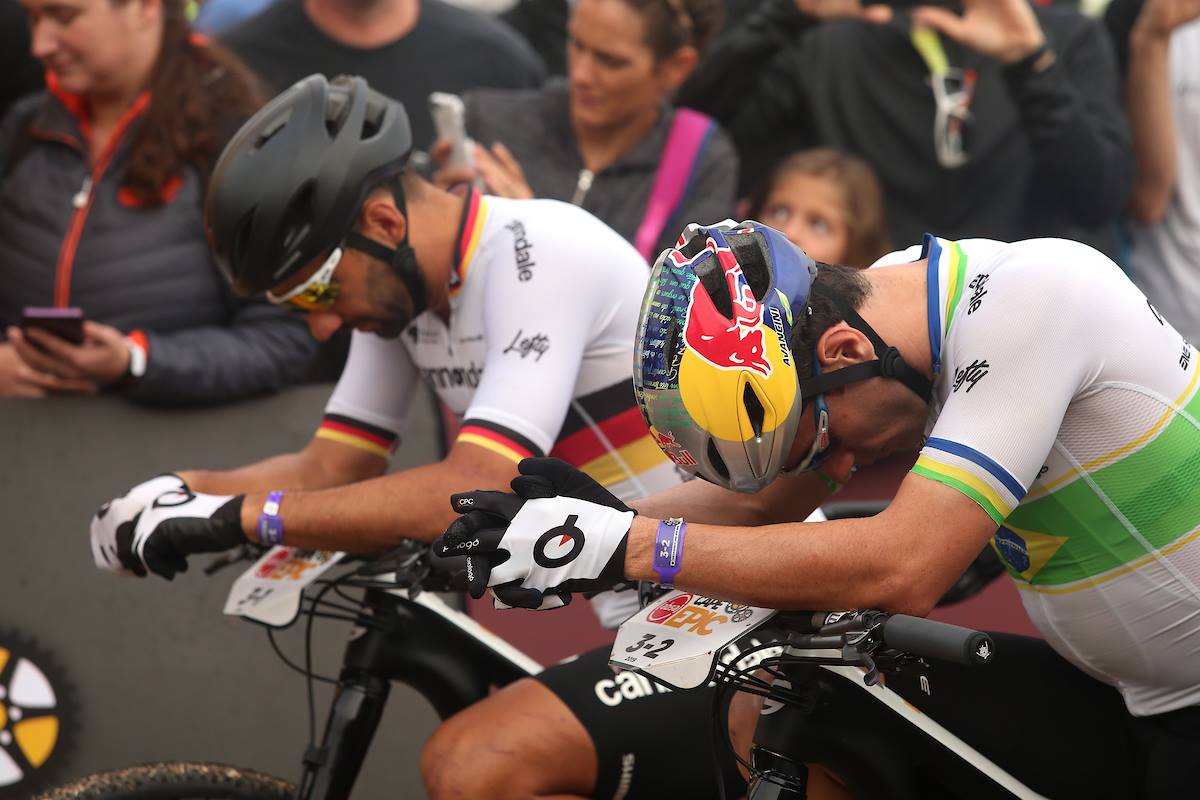In the past couple of weeks many major international sporting events in Europe have been cancelled or postponed, but the 17th Absa Cape Epic will start as planned on Sunday despite widespread Corona Virus fears. Is it the right thing to do?
Over 1300 riders and their supporters will take on the eight-day event that covers 647 kilometres and climbs 15550 metres of unforgiving terrain. Plus another 500 or so staff, media and volunteers which takes the total of number of humans at this event to around 3000, excluding spectators…

Manuel Fumic and Henrique Avancini of Cannondale Factory Racing take a moment before the start during the final stage (stage 7) of the 2019 Absa Cape Epic Mountain Bike stage race. Photo by Shaun Roy/Cape Epic
Global reaction to the Cornova Virus, a potentially deadly strain of the flu virus, has ranged from mass hysteria and panic-sharing to meme creation and joke-sharing. Until recently, South Africa fell into the latter category.
As of today (10 March 2020) seven cases have been confirmed in South Africa, all of them related to a recent trip to Italy. All of them in quarantine. None of them in the Western Cape.
The 2020 Cape Town Cycle Tour just took place without any Corona Virus drama this past Sunday. Over 31 000 entrants, including a number of them from abroad, participated in the event. At this stage, the Western Cape seems to be Corona Virus-free…
There’s been significant behind-the-scenes work on how to manage the Corona Virus threat and on Tuesday night (10 March) the Absa Cape Epic sent out this statement:
The health and well-being of our cyclists, volunteers, partners and staff remains of greatest importance. As with every edition of the Absa Cape Epic, the team has been developing and refining its operational plans with local authorities and agencies over the past year, including relevant safety measures and protocols.
We have further built on these measures to educate and reinforce the hygiene protection measures recommended by the World Health Organization (WHO) after consultation with the WHO Interdepartmental Mass Gatherings Group, the South Africa Department of Health (DOH) via the National Institute for Communicable Diseases (NICD) and the Western Cape Emergency Medical Services, as well as our event medical partner Mediclinic and our safety service provider Eyethu Events.
These additional safety measures promote the daily practice of everyday preventative actions of the spread of germs. In addition to reinforcing these measures, we have increased our supplies and usage of hygiene products, are promoting limited physical contact, routinely cleaning frequently touched surfaces, and educating all staff and volunteers on a number of protocols to include distribution methods for waterpoints and race village catering, among other actions.
It’s filled with the kind of terminology you expect in an official health and safety-themed statement, but in a roundabout way, they’re saying ‘don’t panic, we’ve got this’.


